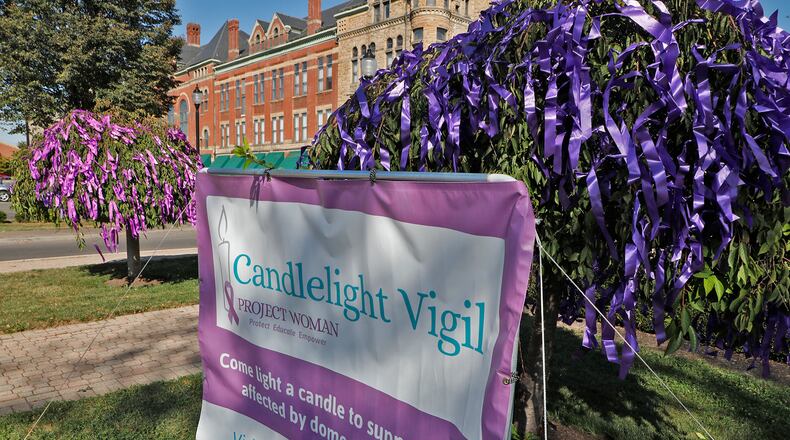The current Ohio law and proposed bills do not include exceptions for rape or incest.
Project Woman, Springfield’s domestic violence shelter and rape crisis center, does not provide or fund abortions, but it works to empower survivors of domestic violence and sexual violence to make their own choices, said Project Woman executive director Laura Baxter. The shelter has already provided more than 3,000 shelter nights so far in 2022.
Baxter has worked with Project Woman for 10 years, where she has heard numerous stories from people about their experiences.
Baxter shared the experience of interacting with a woman several years ago once came to Project Woman after experiencing abuse from her partner.
If the basement walls of the client’s country home could talk, they’d tell stories of the woman being kicked down the stairs by her husband every time she didn’t want to have sex with him. He often would lock her into the stony and damp space — sometimes for several days. She found out after the last time that she was pregnant, a surprise to the woman, as she was entering menopause.
Another time Baxter was in the emergency room helping a college student with the next steps following a sexual assault. The young woman had never had a pelvic exam before then and was unsure of what to expect.
“These things are people’s lived experiences,” Baxter said. “People have to have choices when things happen to them.”
Many choices exist for those who come to Project Woman for help. The shelter and crisis center has crisis stabilization services, short-term and long-term counseling options, trauma-informed support groups and more. Advocates also work to play support roles to survivors, finding them resources that may uniquely fit their situations.
Project Women community advocacy and education coordinator Emily Parsons said that in her job, she works with survivors of sexual and domestic violence to empower them to make decisions about their safety and their healing processes.
Taking away the ability to make decisions for one’s self, she said, is “retraumatizing and harmful,” but also casts more blame on the victim.
“Everyone’s situation is different, and survivors are the experts of their lives,” Parsons said. “As an advocate, I believe that our voices and the survivors’ voices have not been heard in this conversation.”
According to the Rape, Abuse, Incest National Network (RAINN), one out of every six American women has been the victim of an attempted or completed rape in their lifetime. Younger people, too, are at a higher risk of sexual violence, with more than 50% of reported sexual assaults occurring among people aged 18-34.
Parsons also said pregnancy can pose danger to a person who is experiencing intimate partner violence, furthering risk of safety and creating additional barriers to leave an abuser.
According to The American College of Obstetricians and Gynecologists, about 1 in 6 survivors of domestic violence are first abused during pregnancy, something that Parsons has also witnessed among her clients during her work at Project Woman.
In 2019, the CDC reported between 3-6% of pregnant people nationally experienced domestic violence. Clinical research shows a higher prevalence, between 11-28%, according to the 2019 Case Western University study.
Those who experience domestic violence during pregnancy are two times as likely “to miss prenatal appointments or initiate prenatal care later than recommended,” according to the Case Western study.
The study also found that domestic violence during pregnancy and in the postpartum period has also been associated with depression and posttraumatic stress disorder, and infants can face health troubles like low birth weight and a higher risk of perinatal death.
Some abusers, too, will use “reproductive coercion” to control their partner’s ability to get pregnant: this can include refusing to wear condoms, removing a condom during sex without their partners’ knowledge or consent (also called “stealthing”) and controlling the use of and access to other birth control.
“Abusers will control their victims every move, including who they can talk to, where they are allowed to go, what they are allowed to do,” Parson said. “Survivors of domestic violence deserve the power to make decisions in their lives, especially when their voice has been silenced by their abuser.”
Advocates at Project Woman also fear that abortion bans will cause pregnant survivors to die or suffer serious medical consequences: Ohio’s heartbeat law contains an exception to prevent the death of an expecting person “substantial and irreversible impairment of a major bodily function, according to the law’s language.
Doctors, under threat of a felony charge, will be forced to withhold abortion services until a pregnant person’s death or impairment are imminent, the organization said.
In 2020, less than 200 people living in Clark County received an induced abortion, according to the Ohio Department of Health. Clark County does not contain clinics that offer abortion services.
The Ohio Alliance to End Sexual Violence in June denounced the reversal of Roe.
“Survivors of sexual violence often experience long-lasting trauma and commonly endure violation of their bodies,” the federally-designated anti-sexual violence coalition stated in a press release.
Project Woman has a 24-Hour Crisis Line that can be reached at 1-800-634-9893.
By the numbers:
- 1 in 6 American women has been the victim of an attempted or completed rape
- 1 out of every 10 victims of rape are men
- More than 50% of sexual assault occurs among people aged 18-34
Data source: RAINN
About the Author

